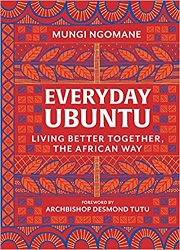
 Everyday Ubuntu
Everyday UbuntuLiving Better Together, the African Way
Review posted May 19, 2020.
Harper Design, 2020. 240 pages.
Review written April 13, 2020, from a library book
Starred Review
This book is written by Archbishop Desmond Tutu’s granddaughter, and it’s full of wisdom learned and demonstrated in South Africa as they worked toward healing their country after Apartheid.
Here is how Desmond Tutu explains ubuntu in his Foreword:
Ubuntu is a concept that, in my community, is one of the most fundamental aspects of living lives of courage, compassion and connection. It is one that I cannot remember not knowing about. I understood from early on in my life that being known as a person with ubuntu was one of the highest accolades one could ever receive. Almost daily we were encouraged to show it in our relations with family, friends and strangers alike. I have often said that the idea and practice of ubuntu is one of Africa’s greatest gifts to the world. A gift with which, unfortunately, not many in the world are familiar. The lesson of ubuntu is best described in a proverb that is found in almost every African language, whose translation is, “A person is a person through other persons.” The fundamental meaning of the proverb is that everything we learn and experience in the world is through our relationships with other people. We are therefore called to examine our actions and thoughts, not just for what they will achieve for us, but for how they impact on others with whom we are in contact.
At its most simple, the teaching of this proverb and of ubuntu is similar to the Golden Rule found in most faith teachings: “Do unto others as you would have them do unto you!” But one who has ubuntu goes a step beyond that. It is not only our actions we are called to keep track of, but our very being in the world. How we live, talk and walk in the world is as much a statement of our character as our actions. One with ubuntu is careful to walk in the world as one who recognizes the infinite worth of everyone with whom he or she comes into contact. So it is not simply a way of behaving, it is indeed a way of being!
The format of the book is simple. After an Introduction, there are fourteen Lessons involving ways you can embody ubuntu. These lessons include stories that illustrate the idea and exercises at the end of the chapter. Each lesson has a different title spread in a bright color with African patterns as the background – it’s an attractive book as well as a meaningful one.
Here are the titles of the fourteen lessons explored in this book:
1. See Yourself in Other People
2. Strength Lies in Unity
3. Put Yourself in the Shoes of Others
4. Choose to See the Wider Perspective
5. Have Dignity and Respect for Yourself and Others
6. Believe in the Good of Everyone
7. Choose Hope Over Optimism
8. Seek Out Ways to Connect
9. The Power of the F-Word – Forgiveness
10. Embrace Our Destiny
11. Acknowledge Reality (However Painful)
12. Find the Humor in Our Humanity
13. Why Little Things Make a Big Difference
14. Learn to Listen So That You Can Hear
You can see that mastering these lessons would indeed make you a better person as you live among other people. The true stories from South Africa’s healing help make these lofty ideals seem possible.
It all adds up to an inspiring and uplifting book. In this time of crisis, it’s all the easier to see that we need to cultivate ubuntu to come together past the difficulties.

